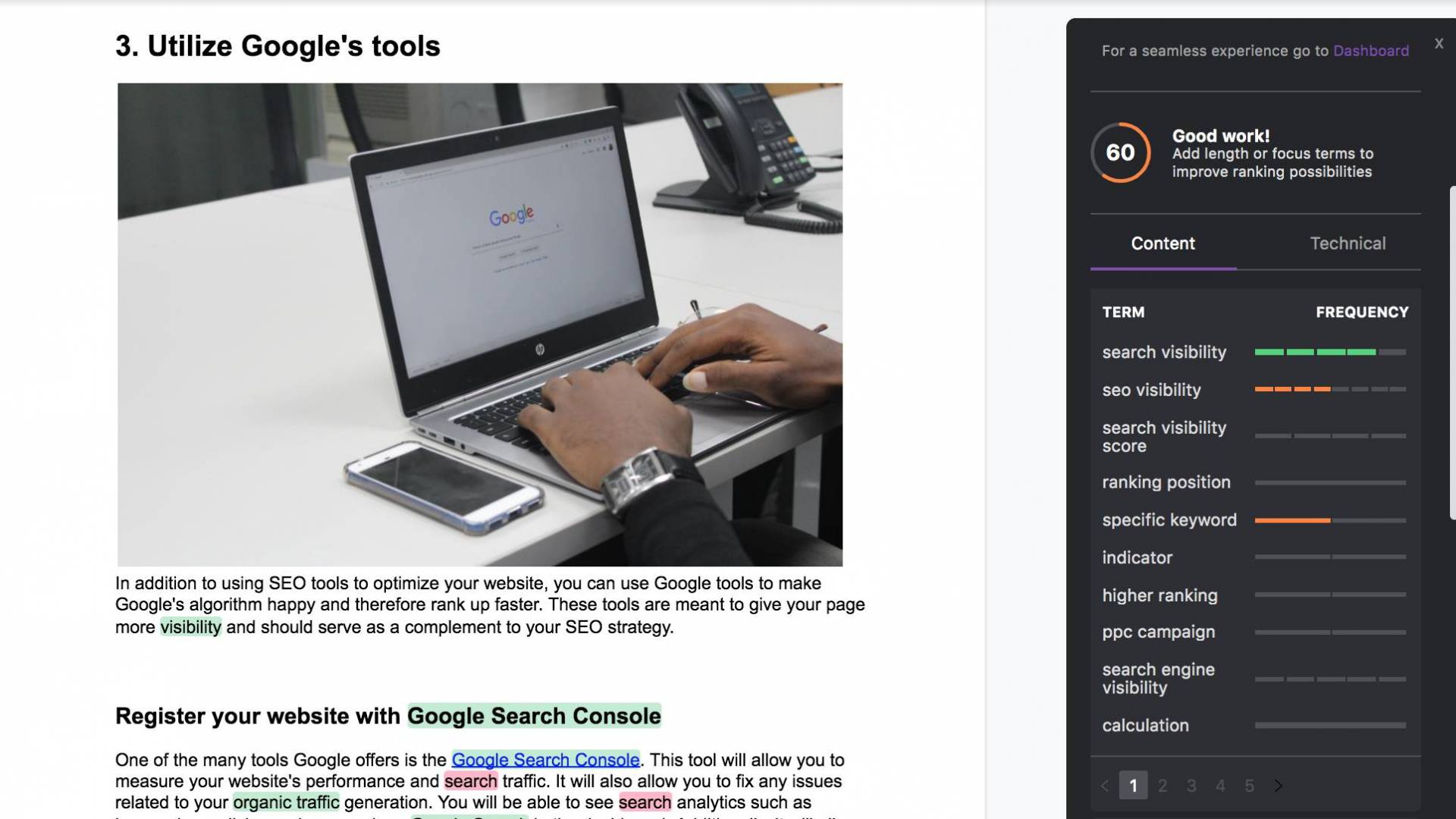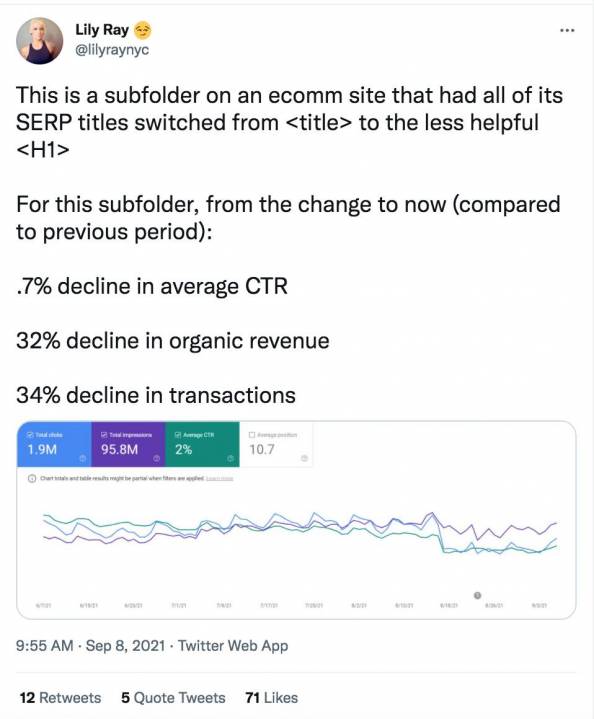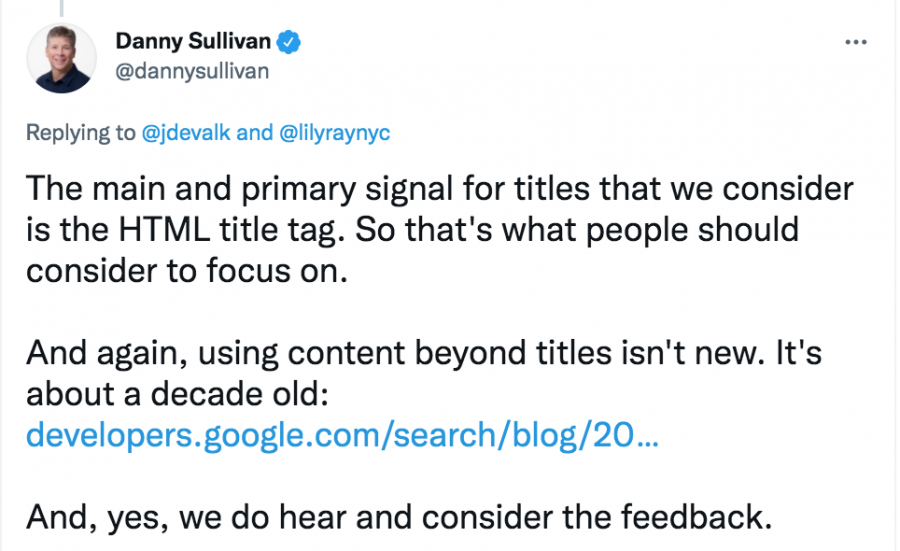Does Google know what your web page content is about better than you do?
Well, Google certainly thinks so. So in August of 2021, Google launched its title tag update, and Google is now rewriting title tags based on what it considers a web page’s content is actually about.
Not every site owner has been happy with the change. So far, some SEOs have observed Google replacing Page Titles with h1 tags. Others have seen negative impacts on clicks, like significant decreases in click-through rates and conversion rates for web pages where Google rewrote page titles.
So if some of these titles are producing worse results, does Google really know best?
Site owners will answer that differently based on whether the Title Tag update has harmed or hurt their SEO performance.
But Google certainly knows a lot more than it used to. As their NLP technology improves, the claim that Google knows best will become even more prevalent in how our content is promoted to searchers.
Here’s everything you need to know about the Title Tag update and what it might tell us about the future of meta tags in SEO.
A Brief History of Meta Tags
Meta tags are snippets of code that help search engine crawlers understand your website content.
For the past two decades, meta tags have been used by SEOs to show Google that their content is relevant to specific keyword queries.
Historically, the meta tags that SEOs have used to optimize their pages are:
- Title Tags: Also called the Page Title, this tag gives an overview of the content. This tag also forms the blue, clickable text of your web pages in the SERPs.

- Meta Descriptions: A description of the content on the page; this tag also appears in the SERP result underneath the page title. (Google has already been rewriting meta descriptions for the past few years.)
- Meta Keywords Attribute: Site owners can use this tag to communicate the keywords they hope to rank for. However, due to years of abuse by black-hat SEOs, Google no longer uses meta keywords as a ranking factor.
- Robots Tags: These tags tell Google crawlers to either index the page or ignore it. It also tells crawlers whether to crawl the links on the page or ignore them.
So although metadata has always been important in SEO, Google’s natural language processing algorithms have grown far more advanced over the years.
That means their crawlers are less reliant on meta tags than they used to be.
It’s possible that as Google’s crawlers grow even more literate, they will one day ignore meta tags entirely.
What is the Title Tag Update?
The Title Tag update is Google’s new system of generating titles for web pages. Consistent with Google’s history of prioritizing users, they want to produce the best titles that connect searchers to the best content.
In a recent blog post, Google claimed that, “Our testing shows the change we’ve introduced produces titles that are more readable and preferred by searchers.”
Because Google is getting so much better at understanding human language, their crawlers are now capable of rewriting your web page’s title for their SERP results if they deem it appropriate to do so.
Google has been going beyond the <title> for several years, but it now also looks to these other on-page elements:
- Content within the <h1> and other header tags
- What the user visually sees on the page
- Words with specific font sizes or styles
- Additional text on the page
- Text within links that point to the page
Google has emphasized that when showing title tags in SERPs, the content inside the <title> tag will still be used over 80% of the time.
Title Tag Best Practices in the Age of NLP
So is there even a point to writing optimized Page Titles if Google is just going to rewrite them anyway?
Absolutely. We are not quite into a meta tag-less world yet. Taking the time to optimize your HTML tags will still produce positive SEO results.
Here are some Page Title SEO reminders to keep in mind.
- Include the keyword or keyword phrase that you want the page to rank for. Make sure the keywords appear naturally and that you avoid keyword stuffing.
- Make sure the page title is unique, relevant, and clickable.
- Don’t exceed 60 characters. Google will only show the first 60 characters of your title tag. Anything higher will be cut off in your SERP result.

Low-quality title tags that are too long, too short, unreadable, or stuffed full of keywords are more likely to get rewritten by Google.
Taking the time to optimize your metadata is still worth it. Most of the time, Google will indeed show it to searchers.
Who Benefits Most From the Title Tag Update?
The reality is that the Page Title Update will most benefit websites with poorly written title tags. However, it will also benefit those websites that haven’t taken the time to optimize their metadata but still have high-quality content on the page.
This may not seem fair that Google is rewarding sites that haven’t taken the time to make their metadata shine, but Google doesn’t really care about what’s fair. Instead, it cares about finding and promoting content with the highest-quality and most substantial relevance to the user’s query. But, of course, they also only want to show users reputable, trustworthy websites.
For this reason, focusing on the content on the entirety of your page is also essential to higher keyword rankings. In addition, improving your content’s topical depth and breadth can also help increase the chances that when Google does rewrite your title tag, it gets the content right.
Using content assistant tools that harness NLP technology can help site owners create more relevant and semantically rich content.

Using content AI tools to improve the semantic signals on your own pages can be a really effective strategy for ranking for more relevant keywords and in higher positions.
Google loves high-quality, in-depth content. So utilizing tools with machine learning and natural language processing capabilities can help you create more of it.
How Google’s Title Tag Update Hints at the Future of Meta Tags
If you’re not happy at the thought of Google rewriting your title tags, you’re not alone.
Google has been taking feedback from webmasters and SEOs about the update. As a result, it has already implemented changes based on various complaints and concerns.
But the reality is, meta tags were never a fully democratic way to determine who should rank and who shouldn’t because it is ripe for manipulation. For example, suppose Google was always required to use the webmaster-generated title tag. In that case, those who aren’t concerned about quality could use the tag to elevate their own pages over others, even if the page experience or content quality is subpar.
That’s why Google has already been going beyond title tags and meta descriptions to promote web pages for several years. Still, Danny Sullivan recently emphasized that for now, the HTML title tag will be used a large majority of the time.
The future of metadata may change, but it’s because search engine technology is getting even better, as with all things SEO, you are more likely to be rewarded if you focus on quality.
Image Credit: Lukas; Pexels; Thank you!












